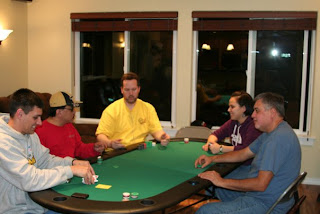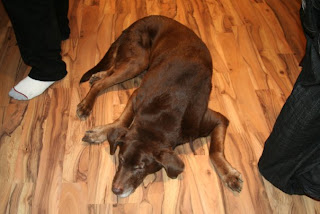I will be on the boat most of this week. In my first year and change on this tour that would mean no poker for me. The game has a fairly large following now and we’ve been playing quite a bit. Winter time is usually best for this, as the sun goes down early forcing us to anchor up before people are exhausted.
I wanted to set up our game as close to the format that someone would run into if they visited a cardroom that ran NL Hold’em, while still being able to limit how many chips I bring with me. So we play $1/$2 NL and we each start with around $150. Of course, we don’t actually play at these stakes, we just emulate them. We’re actually playing for no money at all, meaning if you pull off a bluff, it’s the bluff of the century.
I don’t even think about bringing all of my chips aboard. I only take two racks – 40 black and 160 red chips. The blacks are $1 and the reds are $5. We can only fit five people comfortably on our messdeck, so the best short-handed players usually win. Well, that’s not actually true. We encourage players of all skill levels to play, and the beginners that have no clue how to play usually win. The best short-handed experienced players usually finish up for the night.
The reasons for the beginners running the table are simple enough. First, experienced players have extreme issues deciphering the betting patterns of a first time player, as they are not usually based in logic and experience. This is evident when a new player does the raise $5 pre-flop, bet $1 post-flop routine. Betting $1 into a $14 pot isn’t in any book, especially when it happens every single time.
Second, beginners who are just looking to pass the time simply DO NOT care about the results of the game. I can honestly say my goal when sitting down at a free game is to prove that I am the best player that night. The only way to show this is by winning more chips than anyone else. Beginners don’t think that way. What brought them to the game is what is motivating them – let’s have a good time; let's beat the boredom. So playing trash all the way to the river is very common for these players. It’s not surprising to see a player with J4 winning a big pot at the end by hitting runner-runner two pair.
Third, experienced players are looking to “try things out” at this level of play. I don’t know how many times I’ve put my good friend Justin all-in with nothing sensing some sort of weakness, only to have him call me when he was “pretty sure” (and dead-on) that he had the best king-high hand. This same attempt to play tricky poker against a beginner usually ends in disaster.
Finally, experienced players sometimes forget that the person calling them every single hand might actually have aces or kings this time. It’s too easy to get trapped by a player who simply doesn’t know he’s supposed to be betting his big hands.
All of that aside, I love the boat game. It’s great to sit with people I enjoy and play poker. It reminds me of everything that I love about this game. And this particular version, the Abbie Burgess game, is one that I will miss when I am gone.













